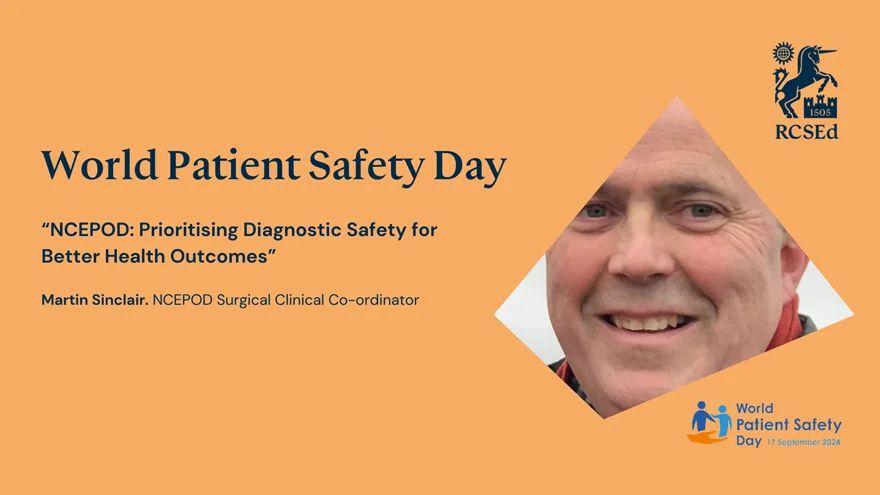
The Patient Safety Group (PSG) of the Royal College of Surgeons of Edinburgh (RCSEd) are delighted to lend our enthusiastic support to the sixth World Patient Safety Day (WPSD). This event, established by the World Health Organisation (WHO) in 2019, takes place on 17 September every year. It helps to raise global awareness amongst all stakeholders about key Patient Safety issues and foster collaboration between patients, health care workers, health care leaders and policy makers to improve patient safety. Each year a new theme is selected to highlight a priority patient safety area for action.
The theme set by the WHO for this year’s WPSD is “Improving diagnosis for patient safety”, recognising the vital importance of correct and timely diagnosis in ensuring patient safety and improving health outcomes.
Ensuring patient safety and improving health outcomes hinges on the critical importance of correct and timely diagnosis. Accurate and prompt diagnosis is the gateway for patients to access the care they need. When diagnoses are delayed, incorrect, or missed, the consequences can be severe, often leading to significant harm.
The National Confidential Enquiry into Patient Outcome and Death (NCEPOD) has shown the importance of timely decision-making, both in terms of diagnosis and in timely access to theatre, for a number of conditions.
The Challenge of Acute Bowel Obstruction – DELAY IN TRANSIT (1)
Acute bowel obstruction remains a significant challenge in emergency care. Despite its relative commonality, identifying patients who require prompt diagnosis and therapy to avoid severe morbidity and mortality is complex. Abdominal pain, nausea, and vomiting are non-specific symptoms that can mask the severity of the condition. While guidelines for managing small and large bowel obstruction exist and improvements have been made through initiatives like the National Emergency Laparotomy Audit (NELA), there remains substantial room for improvement.
Access to timely CT scans and operating theatres are critical for diagnosing and treating bowel obstruction. The recommendation for prompt CT scans with IV contrast to identify serious complications should be a standard practice to ensure swift diagnosis and necessary surgery. Hospitals must have processes to ensure timely access to surgery for critically ill patients, and where standards are not met, resource utilisation must be re-evaluated.
Delays in recognition, senior assessment, imaging, decision-making, and surgery, all contribute to poorer outcomes. Basic assessments of pain, hydration, and nutrition are often inadequate. Each consultant, clinical, and medical director must heed the recommendations of recent reports, ensuring robust, auditable pathways are introduced and consistently followed to maximise patient outcomes.
The Multisystem Impact of Crohn's Disease – MAKING THE CUT? (2)
Crohn's disease is a debilitating condition that affects not only the digestive tract but also the eyes, mouth, joints, and is often associated with mental health issues. These factors contribute to frequent delays in diagnosis. Living with Crohn's disease is challenging, with unpredictable symptoms significantly disrupting patients' lives. Despite authoritative guidance advocating for multidisciplinary care and a coordinated management approach, this often does not occur.
Many patients resistant to medical therapy could benefit from early surgical intervention but instead face prolonged immunosuppressant treatment with its complications or emergency surgery that could have been avoided with better planning. This disease primarily affects young adults during their most productive years, leading to profound socio-economic consequences. However, Crohn's disease lacks the attention, investment, and organisation it deserves, unlike conditions such as cancer. Elevating its status and improving multidisciplinary care co-ordination is essential for better patient outcomes.
The Urgency of Testicular Torsion – TWIST AND SHOUT (3)
Testicular torsion exemplifies a condition where timely intervention is crucial. The treatment window is mere hours to avoid orchidectomy. Delays in diagnosis and treatment stem from several factors, including the sensitive nature of the condition, leading to hesitation in seeking prompt advice. Education for boys, young men, parents, and teachers about the necessity of urgent medical attention for testicular pain is vital.
Once the health service is contacted, patients must be referred immediately to a hospital with appropriate surgical services to avoid transfer delays. Upon admission, prompt senior surgical review and timely access to operating theatres are essential. For patients undergoing orchidectomy, follow-up discussions about prostheses and psychological support should be available, given the significant impact at a developmentally sensitive age.
The development of pathways across healthcare systems based on the GIRFT testicular torsion pathway (4) will ensure patients receive early specialist input and surgery.
Conclusion
Correct and timely diagnosis is fundamental to patient safety and health outcomes. Whether it is acute bowel obstruction, Crohn's disease, or testicular torsion, addressing the systemic and cognitive factors contributing to diagnostic errors is crucial. Implementing robust, auditable pathways, ensuring timely access to necessary diagnostic tools and treatments, and fostering multidisciplinary care co-ordination can significantly improve patient outcomes. Stakeholders, including healthcare providers and policymakers, must prioritise diagnostic safety to ensure patients receive the care they need when they need it most.
NCEPOD is committed to improving patient care. These reports and associated QI tools can be downloaded from our website – www.ncepod.org.uk
Written by Martin Sinclair, NCEPOD Surgical Clinical Co-ordinator, on behalf of NCEPOD
References:
-
National Confidential Enquiry into Patient Outcome and Death. 2020. Delay in Transit. London
-
National Confidential Enquiry into Patient Outcome and Death. 2023. Making the Cut? London
-
National Confidential Enquiry into Patient Outcome and Death. 2024. Twist and Shout. London
-
Getting it Right First Time, Children and Young People. 2024. Testicular Torsion Pathway

